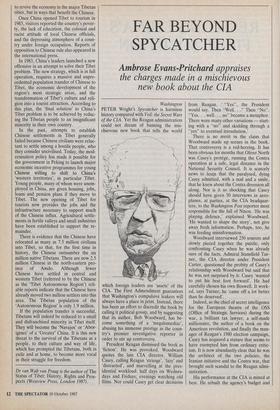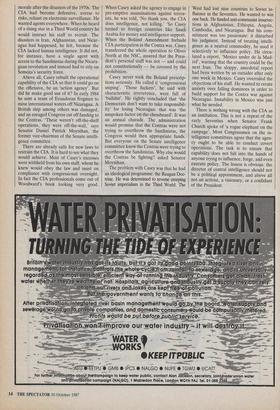FAR BEYOND SPYCATCHER
Ambrose Evans-Pritchard appraises
the charges made in a mischievous new book about the CIA
Washington PETER Wright's Spycatcher is harmless history compared with Veil: the Secret Wars of the CIA. Yet the Reagan administration could not dream of banning the mis- chievous new book that tells the world which foreign leaders are 'assets'• of the CIA. The First Admendment guarantees that Washington's compulsive leakers will always have a place in print. Instead, there has been an effort to discredit the book by calling it political gossip, and by suggesting that its author, Bob Woodward, has be- come something of a `megalomediac', abusing his immense prestige as the coun- try's premier investigative reporter in order to stir up controversy.
President Reagan dismissed the book as 'fiction'. He was provoked. Woodward quotes the late CIA director, William Casey, calling Reagan 'strange', 'lazy' and 'distracted', and marvelling at the pres- idential workload: half days on Wednes- days and Fridays; evenings watching old films. Nor could Casey get clear decisions from Reagan. "'Yes", the President would say. Then "Well. . ." Then "No". "Yes. . . well. . . no" became a metaphor. There were many other variations — start- ing with a "no" and skidding through a "yes" to eventual irresolution.'
There is no merit in the claim that Woodward made up scenes in the book. That controversy is a red-herring. It has been obvious for months that Oliver North was Casey's protégé, running the Contra operation at a safe, legal distance in the National Security Council. It is scarcely news to learn that the paralysed, dying Casey admitted, with a nod and a smile, that he knew about the Contra diversion all along. Nor is it so shocking that Casey should have given 50 interviews in aero- planes, at parties, at the CIA headquar- ters, to the Washington Post reporter most responsible for the fall of Nixon. 'He was playing defence,' explained Woodward. 'He wanted to shape the story', not give away fresh information. Perhaps, too, he was feeding misinformation.
Woodward interviewed 250 sources and slowly pieced together the puzzle, only confronting Casey when he was already sure of the facts. Admiral Stansfield Tur- ner, the CIA director under President Carter, questioned the probity of Casey's relationship with Woodward but said that he was not surprised by it: Casey 'wanted to put his best foot forward'. He had carefully chosen his own Boswell. It work- ed, says Turner; he 'came off a lot better than he deserved'.
Indeed, as the chief of secret intelligence for the European theatre of the OSS (Office of Strategic Services) during the war, a brilliant tax lawyer, a self-made millionaire, the author of a book on the American revolution, and finally the man- ager of Reagan's 1980 election campaign, Casey has acquired a stature that seems to have exempted him from ordinary critic- ism. It is now abundantly clear that he was the architect of, the two policies, the Iranian initiative and the Contra war, that brought such scandal to the Reagan admi- nistration.
His performance at the CIA is mixed at best. He rebuilt the agency's budget and morale after the disasters of the 1970s. The CIA had become defensive, averse to risks, reliant on electronic surveillance. He wanted agents everywhere. When he heard of a rising star in a Third World country he would instruct his staff to recruit. The disasters in Iran, Afghanistan, and Nicar- agua had happened, he felt, because the CIA lacked human intelligence. It did not, for instance, have a single agent with access to the Sandinistas during the Nicara- guan revolution and instead had to rely on Somoza's security force.
Above all, Casey rebuilt the operational capability of the CIA so that it could go on the offensive, be an 'action agency'. But did he make good use of it? In early 1984 he sent a team of Ecuadoran frogmen to mine international waters off Nicaragua. A British ship among others was damaged, and an enraged Congress cut off funding to the Contras. 'These weren't off-the-shelf operations, they were off-the-wall,' says Senator Daniel Patrick Moynihan, the former vice-chairman of the Senate intelli- gence committee.
There are already calls for new laws to restrain the CIA. It is hard to see what they would achieve. Most of Casey's excesses were withheld from his own staff, whom he knew would obey the law and insist on compliance with congressional oversight. In fact the CIA professionals come out of Woodward's book looking very good. When Casey asked the agency to engage in pre-emptive assassinations against terror- ists, he was told, 'No thank you, the CIA does intelligence, not killing.' So Casey turned to foreign countries like Saudi Arabia for money and intelligence support. When the Boland Amendment forbade CIA participation in the Contra war, Casey transferred the whole operation to Oliver North at the NSC, assured that the Presi- dent's personal staff was not — and could not constitutionally — be covered by the prohibition.
Casey never took the Boland prescrip- tions seriously. He called it 'congressional sniping'. 'Those fuckers', he said with characteristic irreverence, were full of 'bullshit'. He rightly concluded that 'the Democrats don't want to take responsibil- ity' for losing Nicaragua: that was 'the unspoken factor on the chessboard'. It was an annual charade. The administration would promise that the Contras were not trying to overthrow the Sandinistas, the Congress would then appropriate funds. But everyone on the Senate intelligence committee knew the Contras were trying to overthrow the Sandinistas. Why else would the Contras be fighting? asked Senator Moynihan.
The problem with Casey was that he had an ideological programme: the Reagan Doc- trine. He was determined to reverse creeping Soviet imperialism in the Third World. The West had lost nine countries to Soviet in- fluence in the Seventies. He wanted to win one back. He funded anti-communist insurrec- tions in Afghanistan, Ethiopia, Angola, Cambodia, and Nicaragua. But his com- mitment was too passionate: it disturbed his judgment. Instead of treating intelli- gence as a neutral commodity, he used it selectively to influence policy. He circu- lated a report, 'Mexico under de la Mad- rid', warning that the country could be the next Iran. The sloppy, anecdotal report had been written by an outsider after only one week in Mexico. Casey overruled the objections of his staff. He wanted to create anxiety over falling dominoes in order to build support for the Contra war against Nicaragua. Instability in Mexico was just what he needed.
There is nothing wrong with the CIA as an institution. This is not a repeat of the early Seventies when Senator Frank Church spoke of 'a rogue elephant on the rampage'. Most Congressmen on the in- telligence committees agree that the agen- cy ought to be able to conduct covert operations. The task is to ensure that capability does not fall into the hands of anyone trying to influence, forge, and even execute policy. The lesson is obvious: the director of central intelligence should not be a political appointment, and above all not an activist, a visionary, or a confidant of the President.



























































 Previous page
Previous page